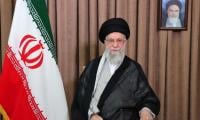Sindh passes bill to establish minorities’ rights commission
Establishment of Sindh Minorities’ Rights Commission Bill-2015 calls for steps to safeguard religious minorities’ rights and end discrimination against them
The Sindh Assembly unanimously passed a private bill on Thursday for establishing a commission to take measures for the protection of the rights of religious minorities and to review proposed laws to end discrimination against them.
The Establishment of Sindh Minorities’ Rights Commission Bill-2015 was presented by Nand Kumar Goklani, an MPA of the Pakistan Muslim League-Functional. The proposed piece of legislation sailed through the provincial legislature on the basis of a report of the assembly’s Standing Committee on Minority Affairs.
The assembly, in its sitting on 26 January, 2016, had referred Kumar’s bill to the standing committee, which held three meetings to consider clause by clause the proposed law concerning the protection of the rights of religious minorities in the province.
The preamble of the draft of the bill says that the bill is aimed at establishing a commission to provide a platform to look into various grievances of the communities of religious minorities and to monitor and suggest a mechanism for accelerating the pace of the socio-economic development of these communities. It says that the proposed commission is very much essential for the promotion and protection of the identity of religious minorities at the provincial level.
The formation of the Sindh Minorities’ Rights Commission would be a driving force in negating the propaganda of human rights violations related to minorities living in Sindh. It would also reiterate the values of religious harmony, tolerance, respect, and peace being the inherent part of the process of the creation of Pakistan.
The bill says that the proposed commission would consist of a chairperson having demonstrated knowledge of or practical experience in matters of rights of religious minorities in particular and human rights in general. The chairperson should be from any of the minority communities with at least 15 years of work experience.
The commission would comprise 11 government-nominated members from amongst persons of eminence, ability and integrity as well as having demonstrable knowledge of or seven years’ practical experience in matters of rights of minorities in particular and human rights in general. Six of the members should be people belonging to religious minorities.
The bill says the commission should comprise 33 percent women members, one representative of the youth, one of lawyers and two activists representing the civil society. The government through a public notice would invite suggestions for suitable persons for appointments as chairperson and members of the commission. The appointments would be made after proper scrutiny of the candidatures of the aspirant candidates.
The chairperson and every member of the commission would hold office for a term of four years from the date of the assumption of office by him or her. Any of the members of the commission should not be less than 35 years of age. The commission would have its headquarters in Karachi and its regional offices would be established at divisional and district levels across the province.
Functions of the proposed commission would include examining policy, programmes and other measures to be taken by the government on issues relating to equality of minorities, their empowerment, protection, political participation, representation and education.
The commission would also review all laws, rules and regulations affecting the status and rights of minorities, and would suggest repeal, amendment or new legislation essential to eliminate discrimination, safeguarding and promoting the interest and welfare of minorities and achieving equality before law in accordance with the constitution and obligations under international covenants and commitments.
The commission would develop and maintain interaction and dialogue with non-governmental organisations, experts and individuals in society and also maintain an active association with similar commissions and institutions in other countries for collaboration and action to achieve equality of minorities at all levels.
Private resolutions
The Sindh Assembly unanimously passed three private resolutions presented by opposition lawmakers.
The resolution, presented by Khurrum Sher Zaman, MPA of the Pakistan Tehreek-e-Insaf, called for the inclusion of the learning of the Holy Quran with meaning in the school curriculum of both public and private educational institutions. The resolutions states: “This House resolves to express its solidarity and support to include learning to read the Holy Quraan with meaning be made mandatory in the education curriculum starting from primary to matriculation for both government and private schools of Sindh.
“The House believes that the benefits of such a move would include the proliferation of knowledge of both the Arabic Language and the Holy Quraan among the students of Sindh and produce well-rounded and enlightened students that would possess both the spiritual and religious knowledge (Deen) as well as the worldly knowledge (Dunya) at the same time.
“In addition, the House also believes that another major benefit would be the improvement in the level of understanding of both the Holy Quraan and Islam. The House resolves that Sindh Government direct the Education Department to take appropriate action to include learning to read the Holy Quraan as part of the education curriculum.”
A resolution, submitted by a lawmaker of the Pakistan Muslim League-Functional, called for the announcement of a public holiday on March 20 every year being the day when the spiritual leader of the Hur Movement in Sindh, Pir Sibghatullah Shah Rashdi, was martyred by British colonial forces in 1940.
The private resolution was passed with an amendment on the suggestion of Parliamentary Affairs Minister Nisar Ahmed Khuhro. Originally, the resolution called upon the government to declare a public holiday on March in the province only every year.
After the amendment, the content of the resolution was changed so as to urge the government to approach the federal government to declare March 20, the day of martyrdom of spiritual leader of the Hur Movement, as a public day on national level.
The resolution of Sorath Thebo, female lawmaker of the Pakistan Muslim League-Nawaz, was also unanimously passed by the assembly. It called for imposing a ban on availability of “black stone” in the province owing to its lethal usage by people of the province, including for committing suicide.
The concerned lawmaker said the use of black stone in committing suicide had proved to be highly lethal with a 100 percent ratio of fatalities as people using them died even before reaching hospital or getting first aid.
Buses for Karachi
Earlier, Transportt Minister Syed Nasir Hussain Shah informed the lawmakers during the question hour that the chief minister had given approval to launching 500 public buses in Karachi for resolving the mass transport problem of the city.
The 500 buses would be brought on to the roads as the first stage of the provincial government’s programme, under which 4,000 buses would be plied.
The minister said the government could consider changing the name of its proposed Orange Line bus service being part of the Bus Rapid Transit Service owing to a train service with a similar name being built in Lahore. The Orange Line bus service is being built from Orangi Town to the Board Office Chowrangi in Nazimabad to merge with the longer Green Line bus service being built till the centre of the city.
-
 Kelly Osbourne's Mom Sharon Receives 'shut Up' Call Accepting An Award For Late Hubby?
Kelly Osbourne's Mom Sharon Receives 'shut Up' Call Accepting An Award For Late Hubby? -
 Claude Overtakes ChatGPT On Apple App Store After Pentagon Dispute
Claude Overtakes ChatGPT On Apple App Store After Pentagon Dispute -
 What Happened To Ayatollah Ali Khamenei's Family During US -Israel Attack On Iran
What Happened To Ayatollah Ali Khamenei's Family During US -Israel Attack On Iran -
 BRIT Awards 2026 Winners Revealed
BRIT Awards 2026 Winners Revealed -
 Shia LaBeouf Arrested Again In New Orleans On Additional Battery Charge
Shia LaBeouf Arrested Again In New Orleans On Additional Battery Charge -
 Shamed Andrew Upset With THIS Family Member Over Current Condition
Shamed Andrew Upset With THIS Family Member Over Current Condition -
 Michael Jackson Estate Sued With Allegations Of Years Of Abuse From Late Singer
Michael Jackson Estate Sued With Allegations Of Years Of Abuse From Late Singer -
 Meghan Markle Shows ‘real Pain’ With Her Body Language In Jordan
Meghan Markle Shows ‘real Pain’ With Her Body Language In Jordan -
 Jennifer Garner Names Her Movie That She Hasn't Seen In Full Since Its Premiere
Jennifer Garner Names Her Movie That She Hasn't Seen In Full Since Its Premiere -
 Bridgerton’s Michelle Mao On Facing Backlash As Season Four Antagonist
Bridgerton’s Michelle Mao On Facing Backlash As Season Four Antagonist -
 King Charles Gets New ‘secret Weapon’ After Andrew Messes Up
King Charles Gets New ‘secret Weapon’ After Andrew Messes Up -
 Shia LaBeouf Makes Bold Claim About Homosexuals In First Interview After Mardi Gras Arrest
Shia LaBeouf Makes Bold Claim About Homosexuals In First Interview After Mardi Gras Arrest -
 Princess Beatrice, Eugenie ‘strained’ As They Are ‘not Turning Back’ On Andrew
Princess Beatrice, Eugenie ‘strained’ As They Are ‘not Turning Back’ On Andrew -
 Benny Blanco Addresses ‘dirty Feet’ Backlash After Podcast Moment Sparks Online Frenzy
Benny Blanco Addresses ‘dirty Feet’ Backlash After Podcast Moment Sparks Online Frenzy -
 Sarah Ferguson Unusual Trait That Confused Royal Expert
Sarah Ferguson Unusual Trait That Confused Royal Expert -
 Prince William, Kate Middleton Left Sarah Ferguson Feeling 'worthless'
Prince William, Kate Middleton Left Sarah Ferguson Feeling 'worthless'



